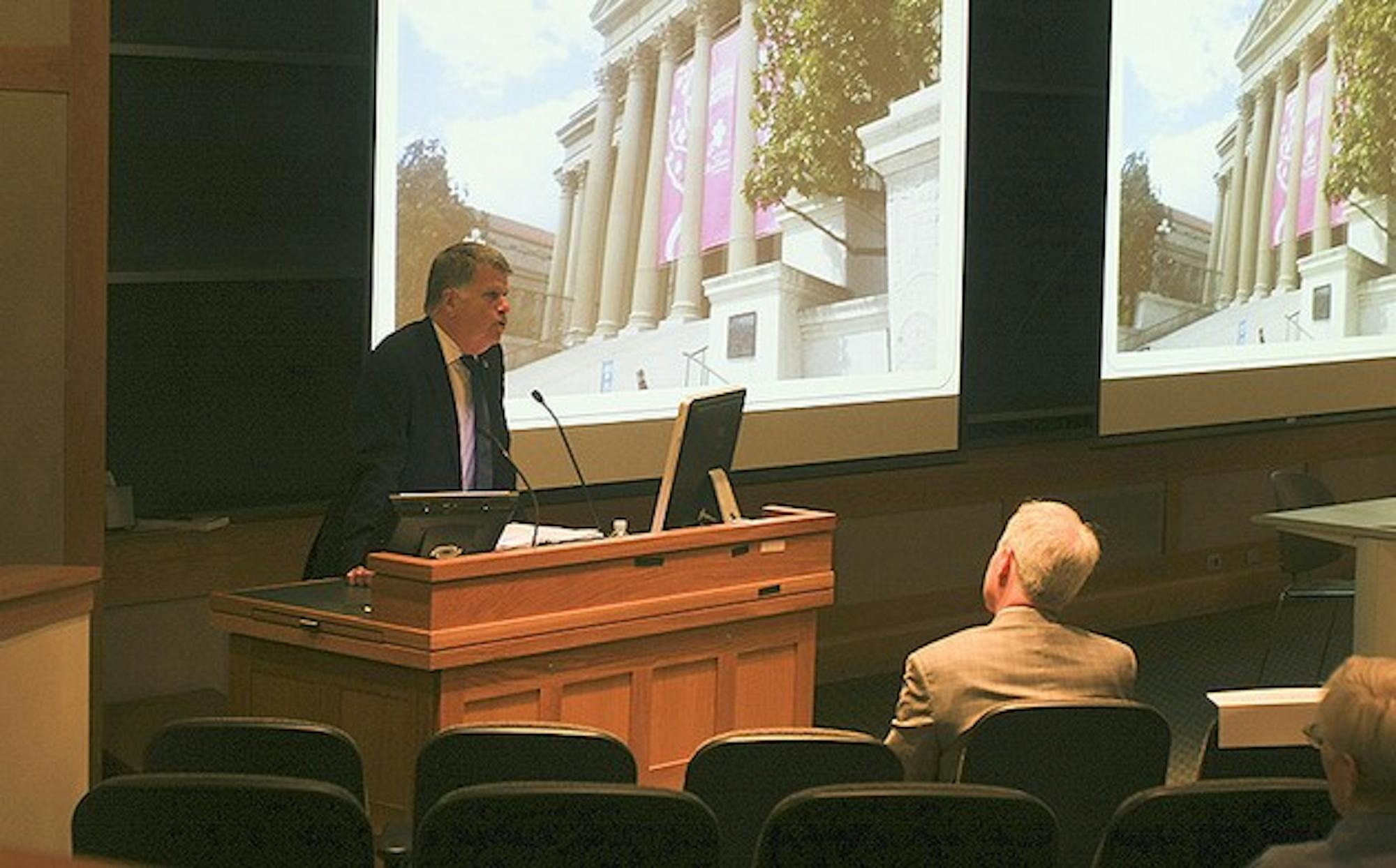U.S. President Barack Obama appointed Ferriero to be the nation's 10th archivist in 2009. Before his appointment, he worked for over 30 years in the Massachusetts Institute of Technology libraries before assuming the top position at Duke University's library. Later, as the Andrew W. Mellon Director of the New York Public Library, he oversaw 91 libraries in total.
Ferriero discussed the role of the National Archive, which he said is often confused with the Library of Congress, in overseeing documents since its creation in 1935. The archive's collection of 12 billion pieces of paper would be enough to circle the earth 84 times, he said.
"We have 44 libraries, and so far I've been to 42 of them," Ferriero said. "We have around a dozen libraries with classified information."
The National Archive is currently undergoing an effort to declassify its documents, with 250,000 reviewed so far, and about 91 percent of those now available to the public. This effort, overseen by the Archive's newly created National Declassification Center, is part of a larger effort to increase government transparency, according to Ferriero.
The archive recently oversaw the declassification of its six oldest classified documents, which contained a recipe for invisible ink, Ferriero said. Furthermore, the archive recently released the 1940 census online, an effort that involved thousands of volunteers nationwide.
In addition to declassifying documents, the Archive has increased its accessibility by branching into new forms of technology, including social media such as Twitter and Facebook. Ferriero recently appointed the archive's first "Wikipedian," a graduate student who works to increase the archive's visibility on Wikipedia.
"I'm a big fan of Wikipedia," he said, noting that the archive's "Document of the Day" feature received 12 million hits the day it was published on Wikipedia, as opposed to its usual 1,000.
He noted that the most meaningful interactions and the ones he misses most, however, are those he had in person with students.
"I still wander around the research room," he said in an interview with The Dartmouth. "It often ends in a conversation about what we could do better."
In his lecture, Ferriero also highlighted the growing division between face-to-face interactions and online-based learning, an "on-site versus online" split that applies to both universities and libraries, he said. He noted that while there is value in making archives available online, personal visits are better for obtaining information and working with librarians.
"I think students have a lot to learn from librarians," he said. "Librarians have a lot of information, not just about the material, but about the process."
The National Archives must contend with the prevalence of theft of valuable documents by both employees and scholars, including the recent case of a film expert discovered selling footage on eBay after 40 years of employment at the Archives. This "betrayal factor" is one of the worries that keeps Ferriero up at night, he said.
"We're constantly walking that line between accessibility and protection," Ferriero said.
Another more serious criminal is known inhouse as "the cupcake thief" because he brought cupcakes to librarians and archivists across the nation and may have been working with dealers to remove thousands of selected documents, according to Ferriero. He was recently sentenced to 18 months in jail. The Archives have utilized digital solutions and employee retraining to combat these issues, as well as user education, Ferriero said.
Ferriero elicited laughter from the audience as he went through a virtual tour of his favorite documents in the archive. These included a U.S. Army document containing Elvis Presley's fingerprints, Ferriero's own 40-year-old letter to former President Lyndon Johnson congratulating him on signing the Civil Rights Act, a copy of the receipt for the Louisiana Purchase and a letter written by Ralph Waldo Emerson criticizing Walt Whitman's ability to do hard work for the government.
"I thought it was fantastic," Anna Leah Berstein Simpson '13, who worked at the Archives for two terms, said. "I'd heard a lot about it from the internal perspective, but it was good to hear about some of the efforts he's spearheading."
Others in attendance mentioned the importance of Ferriero's efforts to digitize records.
"The idea was to understand the issues and challenges that a huge federal agency is dealing with in processing a huge amount of information," Dean of Libraries and Librarian of the College Jeffrey Horrell, who helped organize the lecture, said. "Clearly there are challenges in not only creating the digital records but maintaining them. At Dartmouth, we're thinking about our digital future. We're beginning to live our digital future."
Having a knowledgeable archivist in charge has helped this process, according to College archivist Peter Carini.
"Every time the National Archives opens up a document, it makes it easier to get to," Carini said. "That facilitates potential use by undergraduates of documents they'd otherwise have to go to D.C. to use. As an archivist, it's great to have someone in the National Archives that understands archives."




